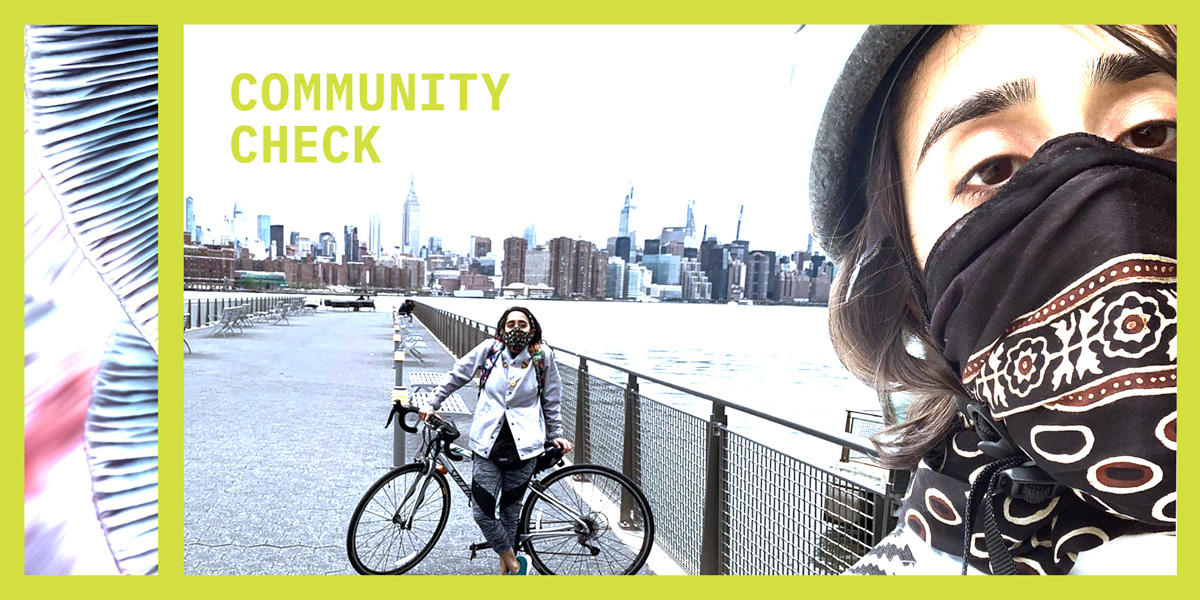
Graphic by Sarah Sarwar // Photos of Sasha Verma contributed by Bani Amor
Mami wouldn’t stop shopping. In the first few weeks of lockdown here in Queens, New York, one of the epicenters of the COVID-19 crisis in North America, she would go out practically every day – unmasked – more than she usually did. Yelling didn’t work to keep her quarantined, but when I started using Corona Courier, a free no-contact delivery service where cyclists pick-up and deliver necessities to marginalized communities in New York City, I was able to give her a concrete alternative. This, coupled with the passing of a family member in her hometown of Guayaquil, Ecuador, ground zero of the pandemic in Latin America, slowed her outings to a stop. Turns out access works better than shame.
“Corona Courier came about after Liz Baldwin did a delivery for a neighbor with her bike,” my friend Sasha Verma, a queer Desi cyclist living in Brooklyn, told me over email. “I had already been thinking about how I could use my bike to help my home-bound friends and neighbors.” She reached out to Liz and became one of the foundational organizers and operators of the project. “The 14-person email chain turned into a Slack workspace of over 450 volunteers. A lot of people just recognized that their bicycles would be a great tool to help others out.”
Corona Courier is one of many mutual aid projects that have sprung up across NYC in response to the COVID-19 crisis and its subsequent mismanagement — to say the very least — by the government and other institutions that gamble with our lives. Mutual aid, a form of non-hierarchical communal care in which individuals provide for each other, is one of the central concepts of the anarchist tradition, though it has existed in many forms throughout pre-colonial Black and Indigenous history. A principal example is the Black Panther Party’s Free Breakfast for Children program established in 1969.
As social and systemic abandonment is nothing new to QTBIPOC, especially amid crises that provide the powers that be with the opportunity to cull our kind out of existence, our projects tend to hold a different weight. “The atmosphere of Corona Courier is very different,” says Sasha of the white cis/het spaces she’s used to. “So many people are openly queer, [and] the energy feels safe.” She adds, “Maybe having so many brown and queer people in the mix has helped to cultivate that.”
I’ve now used Corona Courier three times for groceries and to deliver to groups within the Queens Mutual Aid Network, and each time, I’m deeply touched to know that my family and I are not left alone to scramble to meet our needs. As a disabled person for who social isolation has been the norm for years, I know that care isn’t exclusively communicated through sight and touch — for socialization is often a matter of accessibility. It’s about who shows up.
“Making these connections and finding these alignments has allowed me to not completely fall apart during such a stressful and difficult time,” Sasha says. In this time of physical — not social — distancing, queer mutual aid allows us to transform solitude into solidarity, and make space not just for survival, but for what I call “thrival.”
“We delivered a birthday cake from a teacher to their student in the Bronx for their 18th birthday,” Sasha wrote me. “We all needed a sweet, joyful delivery that day.”
COMMUNITY CHECK is a series about mutual aid and taking care of each other in the time of coronavirus.

Thank you for this. I really wanted to do something like this in my area, but wasn’t sure where to start.
hey, do check out https://mutualaid.nyc, they’ve been compiling resources for people to figure out how to start. my biggest suggestions – write a document with rules about deliveries, create a slack workspace and tell ur friends! <333
Thank you. I am in the other side of the country in LA area, so not NYC.
ok do check out the resources page on the corona courier website, or under the MANYC organizers tab, there are lots of resources for learning how to start something similar in your area :)
i know NYC has a lot of groups popping up, but the concepts/tools can be applied anywhere. best of luck.
Have you been able to plug into anything in LA? I can send resources.
That be cool, thank you.
Have you found anyone since? If you need help lmk
thank you @baniamor for interviewing me, always appreciate your friendship and work. :)))
Love you!
The very gift of God that you actually have with you in the face of knowledge, and the actual manner in which you just keep sharing all your knowledge with others is just amazing as well as so very commendable work you do. Thanksgiving for such amazing work of yours.
Best regards, Angela from https://kingessays.com/dbq-essay.php website.
First, shadows are the reflection of our existence in the space. Then, our shadows overlap, intertwine, communicate. In this project, shadows are turned into subjective via https://ladydahmer.com/ representations of our mind states. Instead of being distorted by the source of light, the audience will be able to control their own shadows by wearing the headsets that collect EEG data from them and accordingly form fake shadows projected onto the ground beside them.